CQUniversity: ACCT20080 Ethical Governance Report Examination
VerifiedAdded on 2022/11/30
|14
|3735
|332
Report
AI Summary
This report provides an analysis of ethical governance, drawing on the Royal Commission into misconduct in the banking, superannuation, and financial services industry. The first part of the report examines the Royal Commission report through the lens of deontological ethics, illustrating how specific examples from the report align with this ethical theory. The second part of the report focuses on Freedom Insurance Group, as detailed in the Royal Commission's final report, and assesses the company's ethical issues using the principles outlined in APES110. The report incorporates key sections from the Royal Commission's findings, including the introduction, banking sections, and the case study on Freedom Insurance, to provide a comprehensive understanding of the ethical challenges within the financial sector and how these challenges relate to the deontological theory and APES110 ethical guidelines.
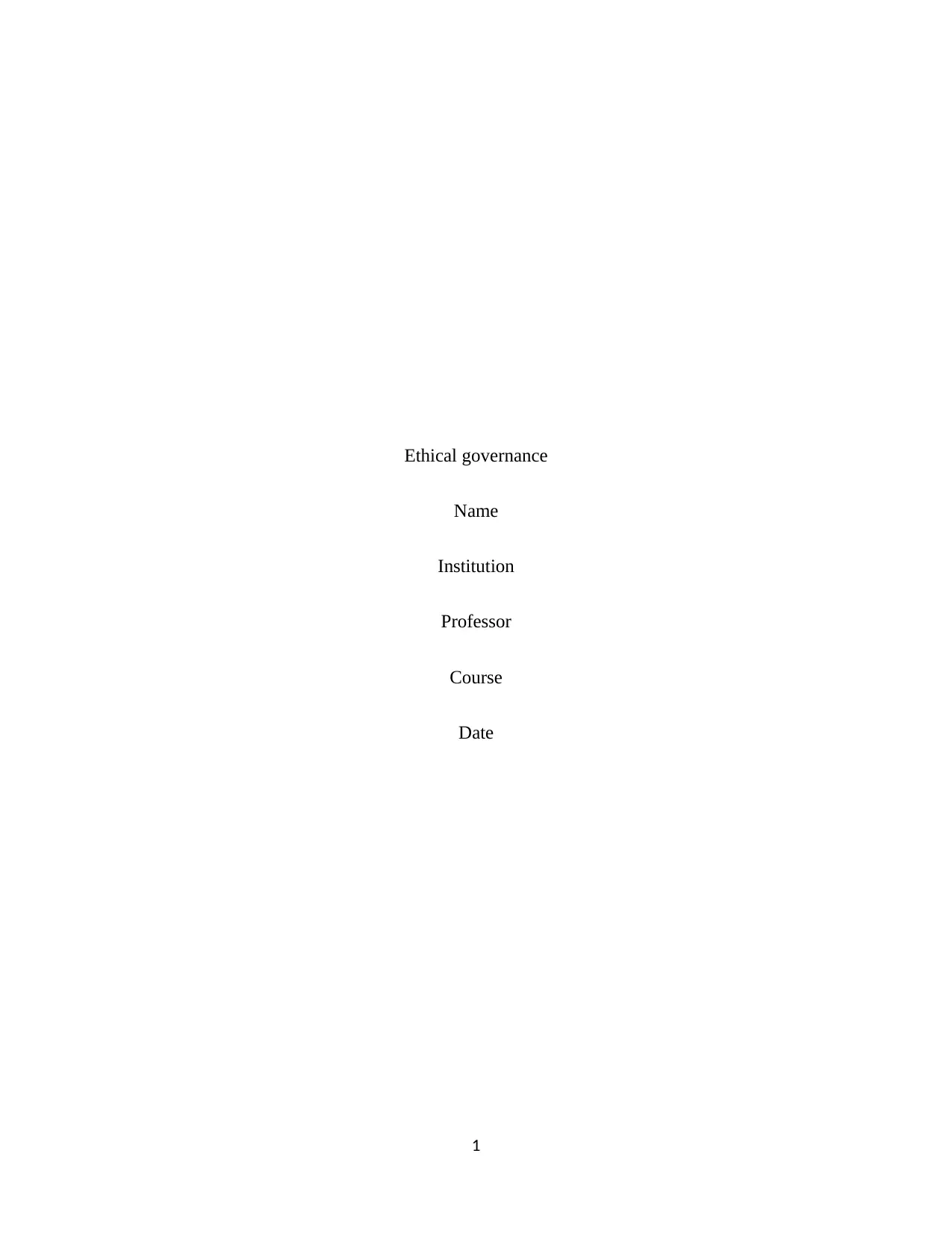
Ethical governance
Name
Institution
Professor
Course
Date
1
Name
Institution
Professor
Course
Date
1
Paraphrase This Document
Need a fresh take? Get an instant paraphrase of this document with our AI Paraphraser
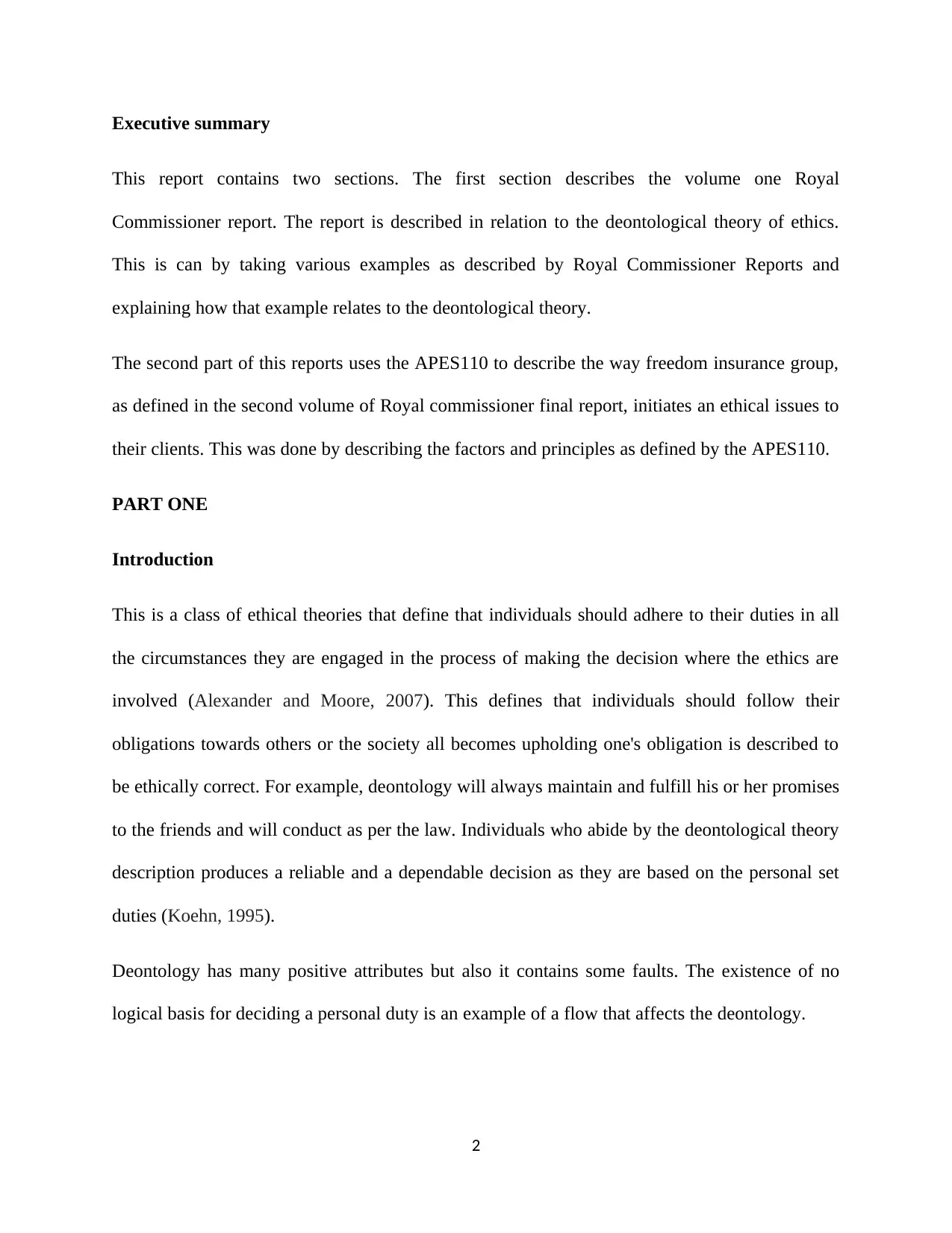
Executive summary
This report contains two sections. The first section describes the volume one Royal
Commissioner report. The report is described in relation to the deontological theory of ethics.
This is can by taking various examples as described by Royal Commissioner Reports and
explaining how that example relates to the deontological theory.
The second part of this reports uses the APES110 to describe the way freedom insurance group,
as defined in the second volume of Royal commissioner final report, initiates an ethical issues to
their clients. This was done by describing the factors and principles as defined by the APES110.
PART ONE
Introduction
This is a class of ethical theories that define that individuals should adhere to their duties in all
the circumstances they are engaged in the process of making the decision where the ethics are
involved (Alexander and Moore, 2007). This defines that individuals should follow their
obligations towards others or the society all becomes upholding one's obligation is described to
be ethically correct. For example, deontology will always maintain and fulfill his or her promises
to the friends and will conduct as per the law. Individuals who abide by the deontological theory
description produces a reliable and a dependable decision as they are based on the personal set
duties (Koehn, 1995).
Deontology has many positive attributes but also it contains some faults. The existence of no
logical basis for deciding a personal duty is an example of a flow that affects the deontology.
2
This report contains two sections. The first section describes the volume one Royal
Commissioner report. The report is described in relation to the deontological theory of ethics.
This is can by taking various examples as described by Royal Commissioner Reports and
explaining how that example relates to the deontological theory.
The second part of this reports uses the APES110 to describe the way freedom insurance group,
as defined in the second volume of Royal commissioner final report, initiates an ethical issues to
their clients. This was done by describing the factors and principles as defined by the APES110.
PART ONE
Introduction
This is a class of ethical theories that define that individuals should adhere to their duties in all
the circumstances they are engaged in the process of making the decision where the ethics are
involved (Alexander and Moore, 2007). This defines that individuals should follow their
obligations towards others or the society all becomes upholding one's obligation is described to
be ethically correct. For example, deontology will always maintain and fulfill his or her promises
to the friends and will conduct as per the law. Individuals who abide by the deontological theory
description produces a reliable and a dependable decision as they are based on the personal set
duties (Koehn, 1995).
Deontology has many positive attributes but also it contains some faults. The existence of no
logical basis for deciding a personal duty is an example of a flow that affects the deontology.
2
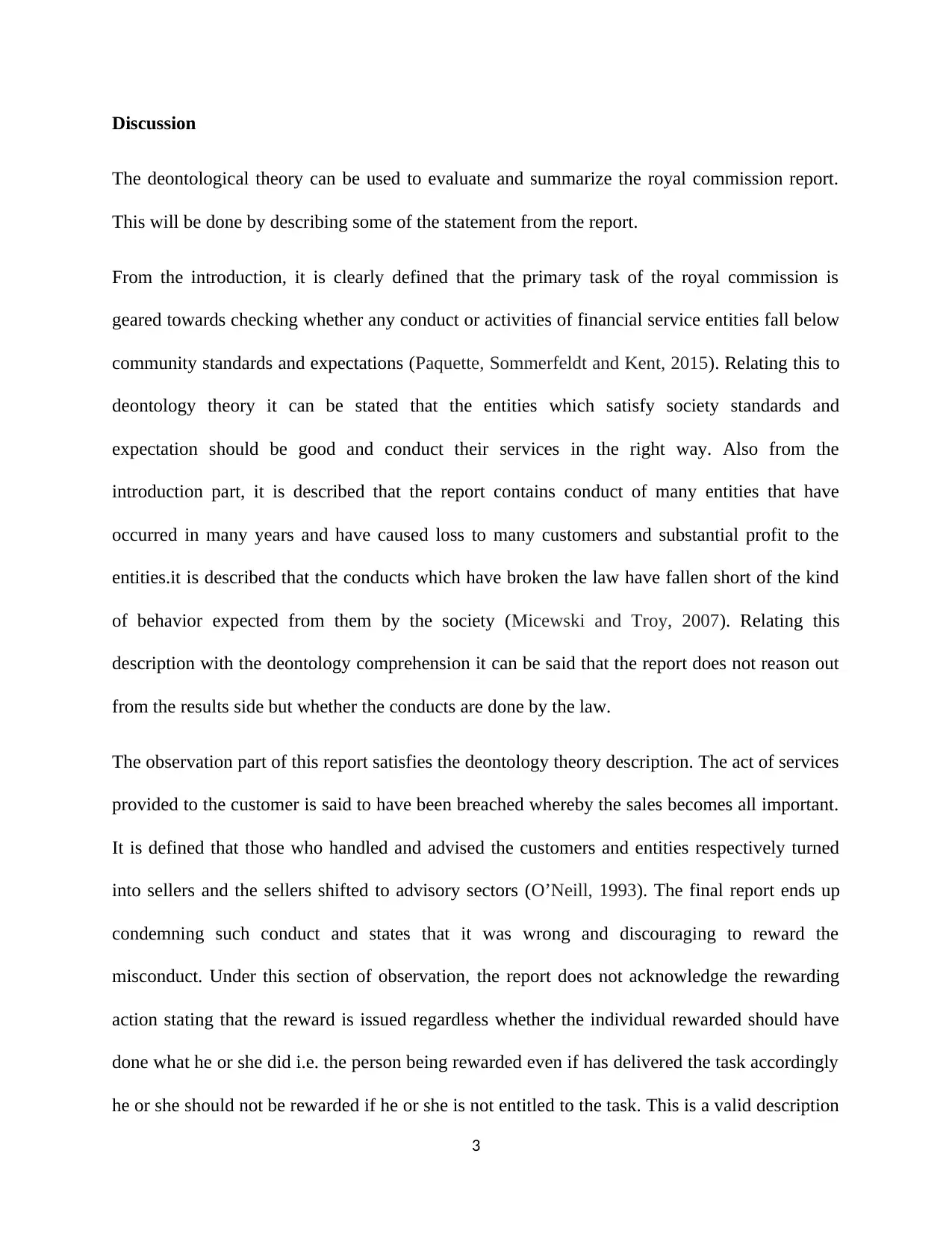
Discussion
The deontological theory can be used to evaluate and summarize the royal commission report.
This will be done by describing some of the statement from the report.
From the introduction, it is clearly defined that the primary task of the royal commission is
geared towards checking whether any conduct or activities of financial service entities fall below
community standards and expectations (Paquette, Sommerfeldt and Kent, 2015). Relating this to
deontology theory it can be stated that the entities which satisfy society standards and
expectation should be good and conduct their services in the right way. Also from the
introduction part, it is described that the report contains conduct of many entities that have
occurred in many years and have caused loss to many customers and substantial profit to the
entities.it is described that the conducts which have broken the law have fallen short of the kind
of behavior expected from them by the society (Micewski and Troy, 2007). Relating this
description with the deontology comprehension it can be said that the report does not reason out
from the results side but whether the conducts are done by the law.
The observation part of this report satisfies the deontology theory description. The act of services
provided to the customer is said to have been breached whereby the sales becomes all important.
It is defined that those who handled and advised the customers and entities respectively turned
into sellers and the sellers shifted to advisory sectors (O’Neill, 1993). The final report ends up
condemning such conduct and states that it was wrong and discouraging to reward the
misconduct. Under this section of observation, the report does not acknowledge the rewarding
action stating that the reward is issued regardless whether the individual rewarded should have
done what he or she did i.e. the person being rewarded even if has delivered the task accordingly
he or she should not be rewarded if he or she is not entitled to the task. This is a valid description
3
The deontological theory can be used to evaluate and summarize the royal commission report.
This will be done by describing some of the statement from the report.
From the introduction, it is clearly defined that the primary task of the royal commission is
geared towards checking whether any conduct or activities of financial service entities fall below
community standards and expectations (Paquette, Sommerfeldt and Kent, 2015). Relating this to
deontology theory it can be stated that the entities which satisfy society standards and
expectation should be good and conduct their services in the right way. Also from the
introduction part, it is described that the report contains conduct of many entities that have
occurred in many years and have caused loss to many customers and substantial profit to the
entities.it is described that the conducts which have broken the law have fallen short of the kind
of behavior expected from them by the society (Micewski and Troy, 2007). Relating this
description with the deontology comprehension it can be said that the report does not reason out
from the results side but whether the conducts are done by the law.
The observation part of this report satisfies the deontology theory description. The act of services
provided to the customer is said to have been breached whereby the sales becomes all important.
It is defined that those who handled and advised the customers and entities respectively turned
into sellers and the sellers shifted to advisory sectors (O’Neill, 1993). The final report ends up
condemning such conduct and states that it was wrong and discouraging to reward the
misconduct. Under this section of observation, the report does not acknowledge the rewarding
action stating that the reward is issued regardless whether the individual rewarded should have
done what he or she did i.e. the person being rewarded even if has delivered the task accordingly
he or she should not be rewarded if he or she is not entitled to the task. This is a valid description
3
⊘ This is a preview!⊘
Do you want full access?
Subscribe today to unlock all pages.

Trusted by 1+ million students worldwide
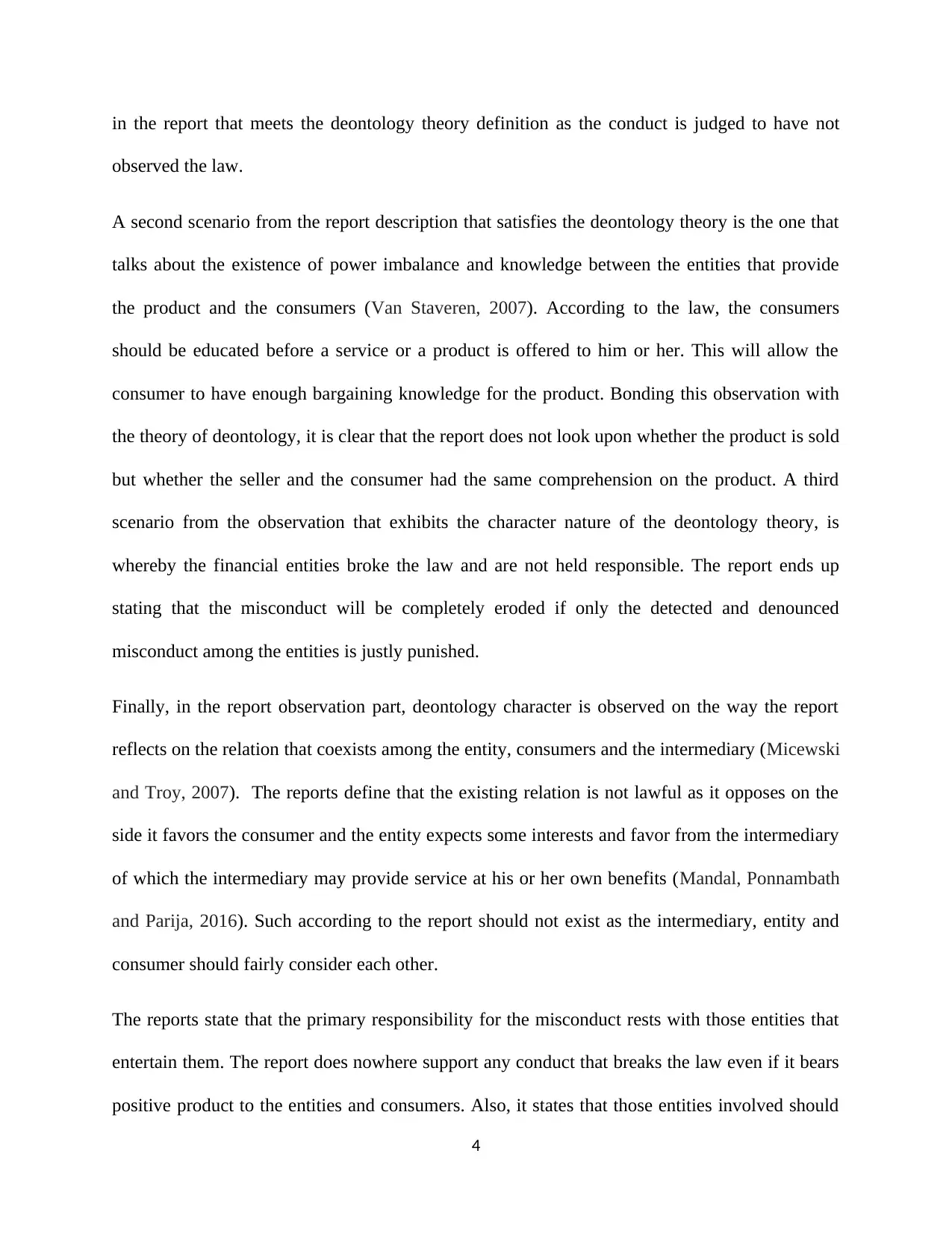
in the report that meets the deontology theory definition as the conduct is judged to have not
observed the law.
A second scenario from the report description that satisfies the deontology theory is the one that
talks about the existence of power imbalance and knowledge between the entities that provide
the product and the consumers (Van Staveren, 2007). According to the law, the consumers
should be educated before a service or a product is offered to him or her. This will allow the
consumer to have enough bargaining knowledge for the product. Bonding this observation with
the theory of deontology, it is clear that the report does not look upon whether the product is sold
but whether the seller and the consumer had the same comprehension on the product. A third
scenario from the observation that exhibits the character nature of the deontology theory, is
whereby the financial entities broke the law and are not held responsible. The report ends up
stating that the misconduct will be completely eroded if only the detected and denounced
misconduct among the entities is justly punished.
Finally, in the report observation part, deontology character is observed on the way the report
reflects on the relation that coexists among the entity, consumers and the intermediary (Micewski
and Troy, 2007). The reports define that the existing relation is not lawful as it opposes on the
side it favors the consumer and the entity expects some interests and favor from the intermediary
of which the intermediary may provide service at his or her own benefits (Mandal, Ponnambath
and Parija, 2016). Such according to the report should not exist as the intermediary, entity and
consumer should fairly consider each other.
The reports state that the primary responsibility for the misconduct rests with those entities that
entertain them. The report does nowhere support any conduct that breaks the law even if it bears
positive product to the entities and consumers. Also, it states that those entities involved should
4
observed the law.
A second scenario from the report description that satisfies the deontology theory is the one that
talks about the existence of power imbalance and knowledge between the entities that provide
the product and the consumers (Van Staveren, 2007). According to the law, the consumers
should be educated before a service or a product is offered to him or her. This will allow the
consumer to have enough bargaining knowledge for the product. Bonding this observation with
the theory of deontology, it is clear that the report does not look upon whether the product is sold
but whether the seller and the consumer had the same comprehension on the product. A third
scenario from the observation that exhibits the character nature of the deontology theory, is
whereby the financial entities broke the law and are not held responsible. The report ends up
stating that the misconduct will be completely eroded if only the detected and denounced
misconduct among the entities is justly punished.
Finally, in the report observation part, deontology character is observed on the way the report
reflects on the relation that coexists among the entity, consumers and the intermediary (Micewski
and Troy, 2007). The reports define that the existing relation is not lawful as it opposes on the
side it favors the consumer and the entity expects some interests and favor from the intermediary
of which the intermediary may provide service at his or her own benefits (Mandal, Ponnambath
and Parija, 2016). Such according to the report should not exist as the intermediary, entity and
consumer should fairly consider each other.
The reports state that the primary responsibility for the misconduct rests with those entities that
entertain them. The report does nowhere support any conduct that breaks the law even if it bears
positive product to the entities and consumers. Also, it states that those entities involved should
4
Paraphrase This Document
Need a fresh take? Get an instant paraphrase of this document with our AI Paraphraser
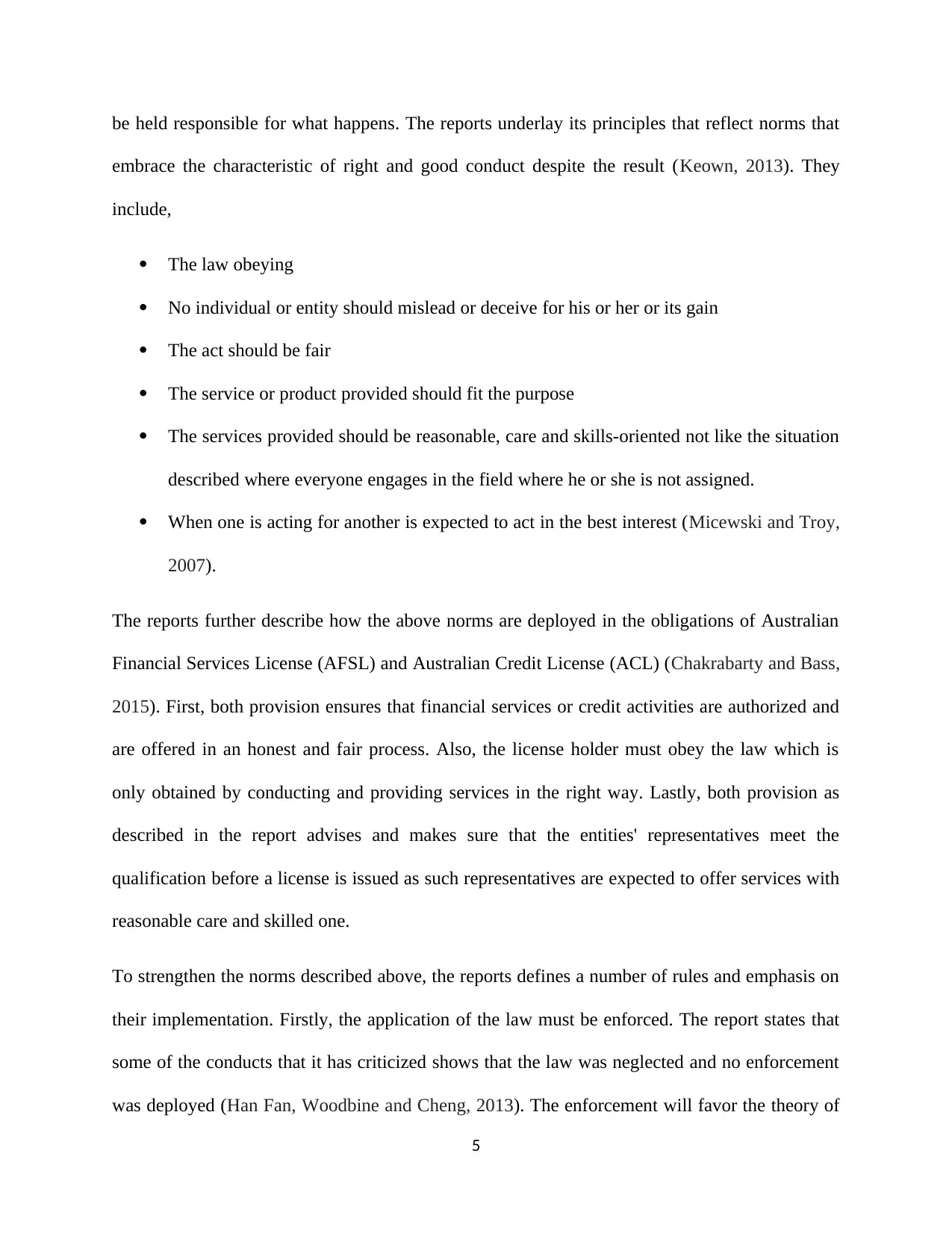
be held responsible for what happens. The reports underlay its principles that reflect norms that
embrace the characteristic of right and good conduct despite the result (Keown, 2013). They
include,
The law obeying
No individual or entity should mislead or deceive for his or her or its gain
The act should be fair
The service or product provided should fit the purpose
The services provided should be reasonable, care and skills-oriented not like the situation
described where everyone engages in the field where he or she is not assigned.
When one is acting for another is expected to act in the best interest (Micewski and Troy,
2007).
The reports further describe how the above norms are deployed in the obligations of Australian
Financial Services License (AFSL) and Australian Credit License (ACL) (Chakrabarty and Bass,
2015). First, both provision ensures that financial services or credit activities are authorized and
are offered in an honest and fair process. Also, the license holder must obey the law which is
only obtained by conducting and providing services in the right way. Lastly, both provision as
described in the report advises and makes sure that the entities' representatives meet the
qualification before a license is issued as such representatives are expected to offer services with
reasonable care and skilled one.
To strengthen the norms described above, the reports defines a number of rules and emphasis on
their implementation. Firstly, the application of the law must be enforced. The report states that
some of the conducts that it has criticized shows that the law was neglected and no enforcement
was deployed (Han Fan, Woodbine and Cheng, 2013). The enforcement will favor the theory of
5
embrace the characteristic of right and good conduct despite the result (Keown, 2013). They
include,
The law obeying
No individual or entity should mislead or deceive for his or her or its gain
The act should be fair
The service or product provided should fit the purpose
The services provided should be reasonable, care and skills-oriented not like the situation
described where everyone engages in the field where he or she is not assigned.
When one is acting for another is expected to act in the best interest (Micewski and Troy,
2007).
The reports further describe how the above norms are deployed in the obligations of Australian
Financial Services License (AFSL) and Australian Credit License (ACL) (Chakrabarty and Bass,
2015). First, both provision ensures that financial services or credit activities are authorized and
are offered in an honest and fair process. Also, the license holder must obey the law which is
only obtained by conducting and providing services in the right way. Lastly, both provision as
described in the report advises and makes sure that the entities' representatives meet the
qualification before a license is issued as such representatives are expected to offer services with
reasonable care and skilled one.
To strengthen the norms described above, the reports defines a number of rules and emphasis on
their implementation. Firstly, the application of the law must be enforced. The report states that
some of the conducts that it has criticized shows that the law was neglected and no enforcement
was deployed (Han Fan, Woodbine and Cheng, 2013). The enforcement will favor the theory of
5
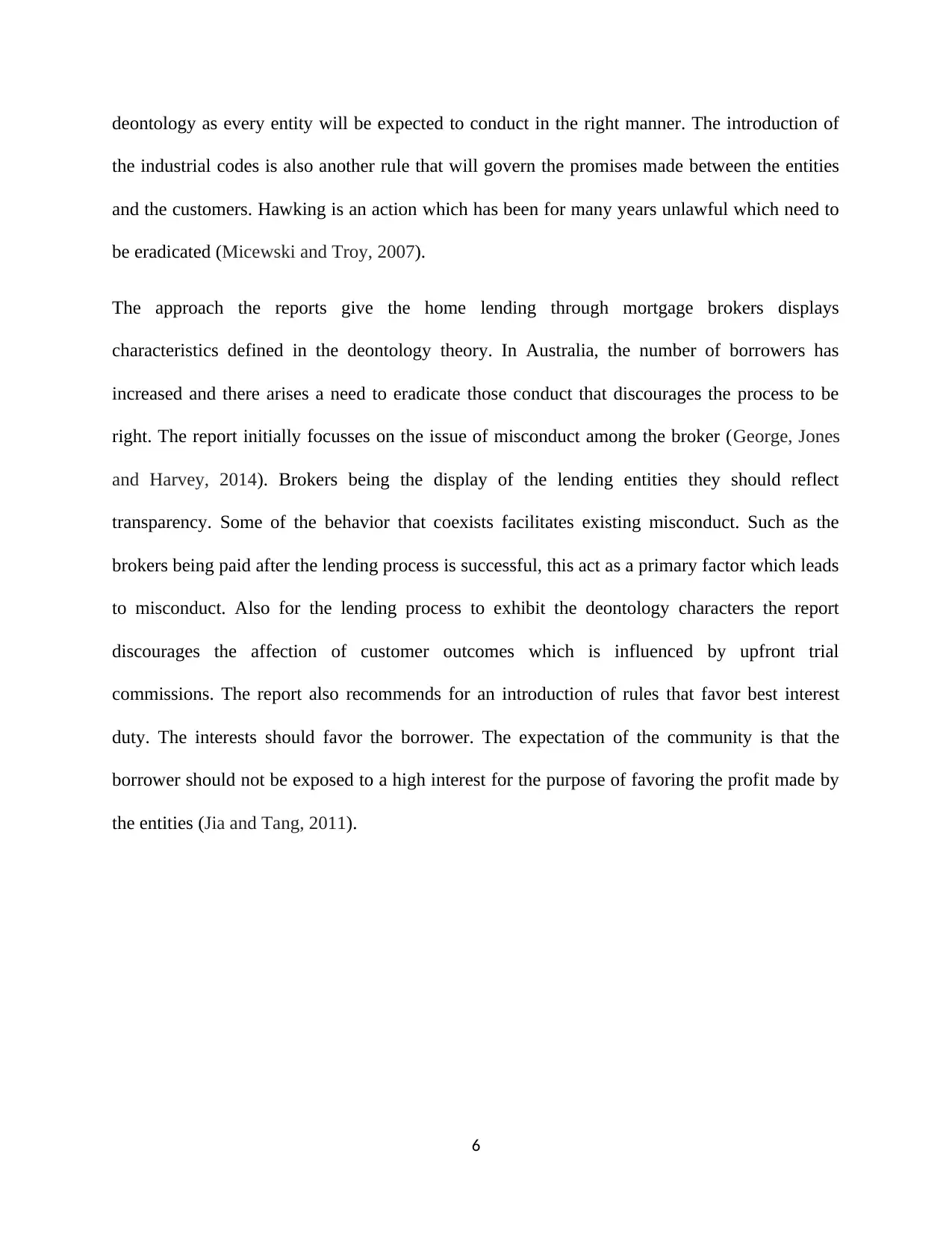
deontology as every entity will be expected to conduct in the right manner. The introduction of
the industrial codes is also another rule that will govern the promises made between the entities
and the customers. Hawking is an action which has been for many years unlawful which need to
be eradicated (Micewski and Troy, 2007).
The approach the reports give the home lending through mortgage brokers displays
characteristics defined in the deontology theory. In Australia, the number of borrowers has
increased and there arises a need to eradicate those conduct that discourages the process to be
right. The report initially focusses on the issue of misconduct among the broker (George, Jones
and Harvey, 2014). Brokers being the display of the lending entities they should reflect
transparency. Some of the behavior that coexists facilitates existing misconduct. Such as the
brokers being paid after the lending process is successful, this act as a primary factor which leads
to misconduct. Also for the lending process to exhibit the deontology characters the report
discourages the affection of customer outcomes which is influenced by upfront trial
commissions. The report also recommends for an introduction of rules that favor best interest
duty. The interests should favor the borrower. The expectation of the community is that the
borrower should not be exposed to a high interest for the purpose of favoring the profit made by
the entities (Jia and Tang, 2011).
6
the industrial codes is also another rule that will govern the promises made between the entities
and the customers. Hawking is an action which has been for many years unlawful which need to
be eradicated (Micewski and Troy, 2007).
The approach the reports give the home lending through mortgage brokers displays
characteristics defined in the deontology theory. In Australia, the number of borrowers has
increased and there arises a need to eradicate those conduct that discourages the process to be
right. The report initially focusses on the issue of misconduct among the broker (George, Jones
and Harvey, 2014). Brokers being the display of the lending entities they should reflect
transparency. Some of the behavior that coexists facilitates existing misconduct. Such as the
brokers being paid after the lending process is successful, this act as a primary factor which leads
to misconduct. Also for the lending process to exhibit the deontology characters the report
discourages the affection of customer outcomes which is influenced by upfront trial
commissions. The report also recommends for an introduction of rules that favor best interest
duty. The interests should favor the borrower. The expectation of the community is that the
borrower should not be exposed to a high interest for the purpose of favoring the profit made by
the entities (Jia and Tang, 2011).
6
⊘ This is a preview!⊘
Do you want full access?
Subscribe today to unlock all pages.

Trusted by 1+ million students worldwide
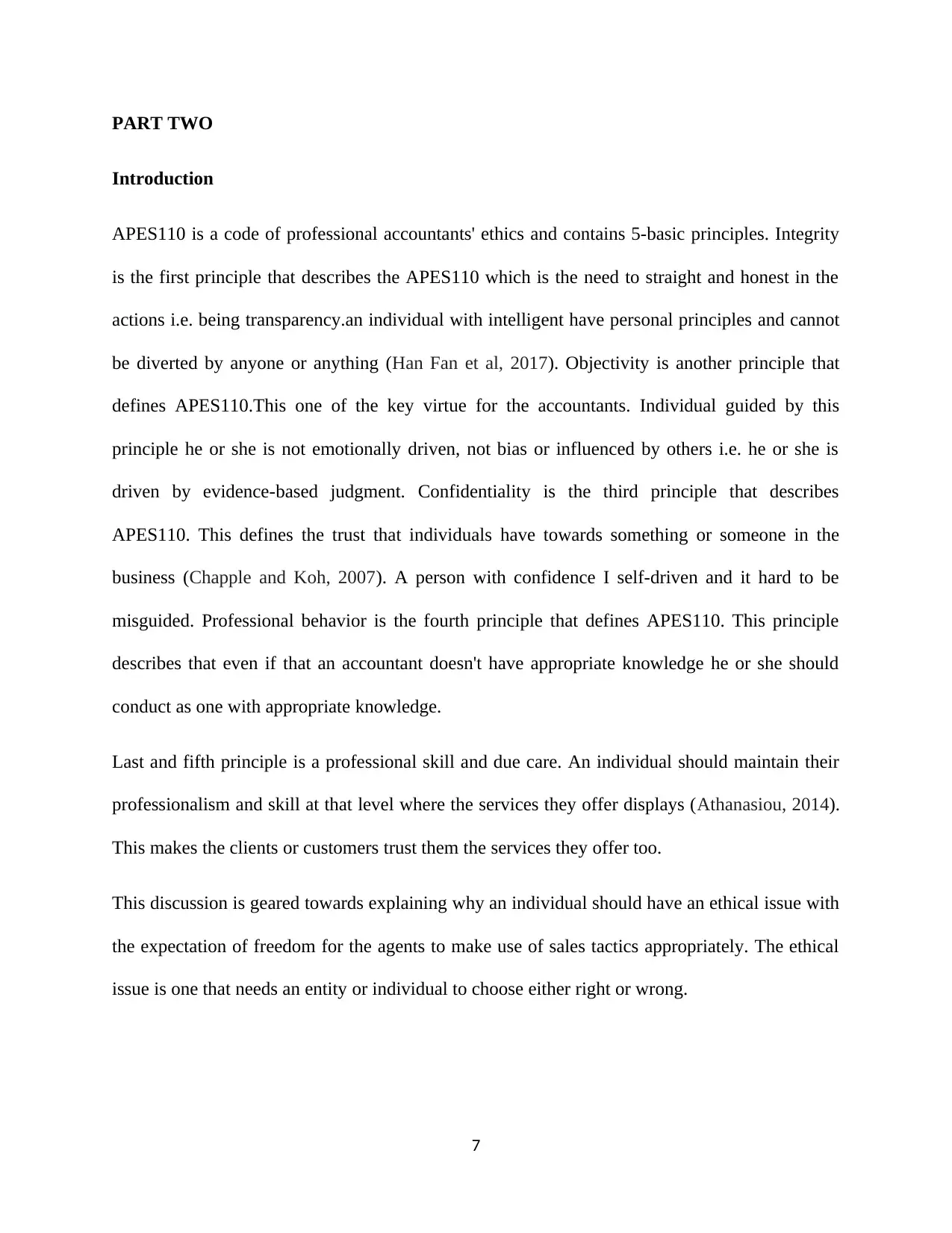
PART TWO
Introduction
APES110 is a code of professional accountants' ethics and contains 5-basic principles. Integrity
is the first principle that describes the APES110 which is the need to straight and honest in the
actions i.e. being transparency.an individual with intelligent have personal principles and cannot
be diverted by anyone or anything (Han Fan et al, 2017). Objectivity is another principle that
defines APES110.This one of the key virtue for the accountants. Individual guided by this
principle he or she is not emotionally driven, not bias or influenced by others i.e. he or she is
driven by evidence-based judgment. Confidentiality is the third principle that describes
APES110. This defines the trust that individuals have towards something or someone in the
business (Chapple and Koh, 2007). A person with confidence I self-driven and it hard to be
misguided. Professional behavior is the fourth principle that defines APES110. This principle
describes that even if that an accountant doesn't have appropriate knowledge he or she should
conduct as one with appropriate knowledge.
Last and fifth principle is a professional skill and due care. An individual should maintain their
professionalism and skill at that level where the services they offer displays (Athanasiou, 2014).
This makes the clients or customers trust them the services they offer too.
This discussion is geared towards explaining why an individual should have an ethical issue with
the expectation of freedom for the agents to make use of sales tactics appropriately. The ethical
issue is one that needs an entity or individual to choose either right or wrong.
7
Introduction
APES110 is a code of professional accountants' ethics and contains 5-basic principles. Integrity
is the first principle that describes the APES110 which is the need to straight and honest in the
actions i.e. being transparency.an individual with intelligent have personal principles and cannot
be diverted by anyone or anything (Han Fan et al, 2017). Objectivity is another principle that
defines APES110.This one of the key virtue for the accountants. Individual guided by this
principle he or she is not emotionally driven, not bias or influenced by others i.e. he or she is
driven by evidence-based judgment. Confidentiality is the third principle that describes
APES110. This defines the trust that individuals have towards something or someone in the
business (Chapple and Koh, 2007). A person with confidence I self-driven and it hard to be
misguided. Professional behavior is the fourth principle that defines APES110. This principle
describes that even if that an accountant doesn't have appropriate knowledge he or she should
conduct as one with appropriate knowledge.
Last and fifth principle is a professional skill and due care. An individual should maintain their
professionalism and skill at that level where the services they offer displays (Athanasiou, 2014).
This makes the clients or customers trust them the services they offer too.
This discussion is geared towards explaining why an individual should have an ethical issue with
the expectation of freedom for the agents to make use of sales tactics appropriately. The ethical
issue is one that needs an entity or individual to choose either right or wrong.
7
Paraphrase This Document
Need a fresh take? Get an instant paraphrase of this document with our AI Paraphraser
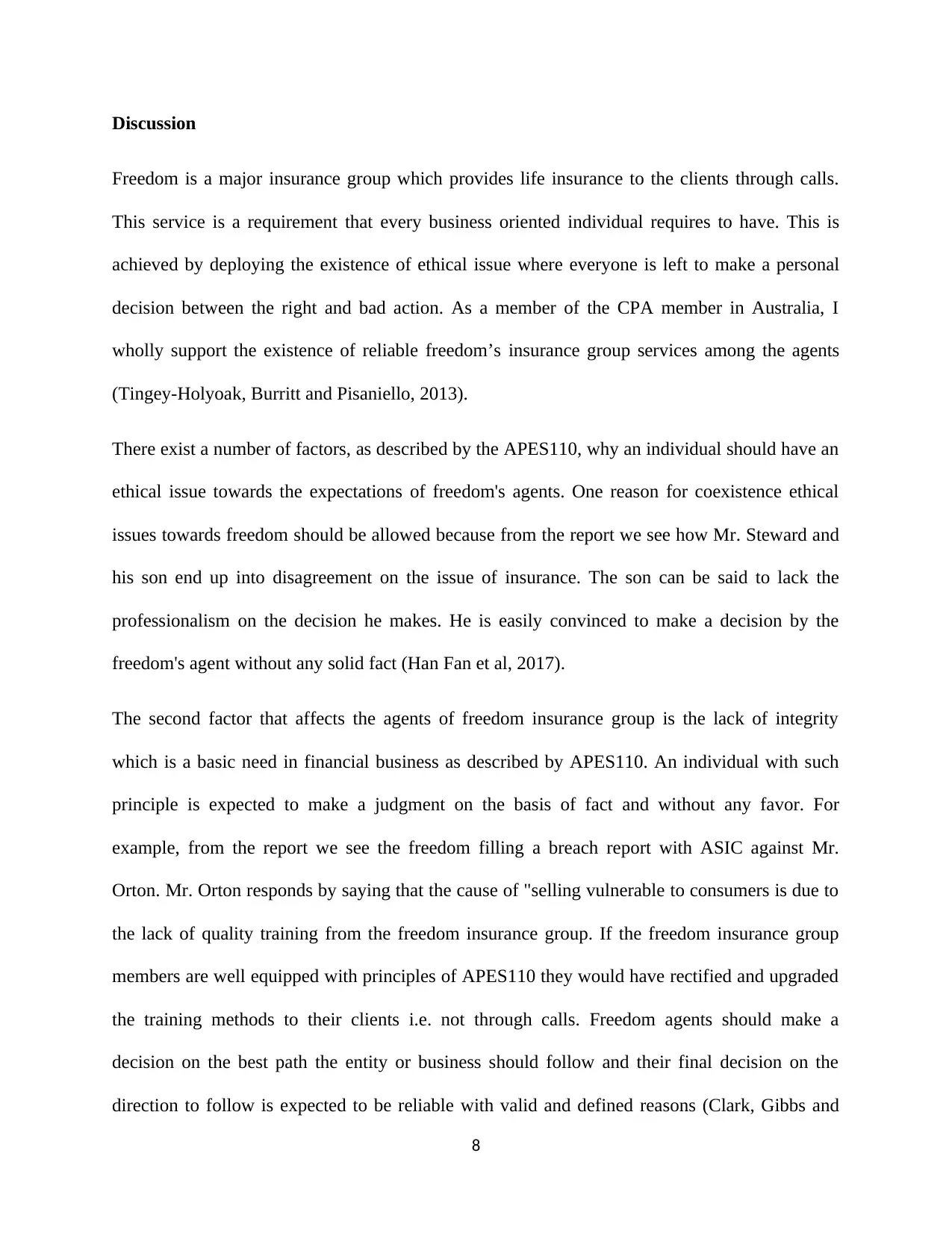
Discussion
Freedom is a major insurance group which provides life insurance to the clients through calls.
This service is a requirement that every business oriented individual requires to have. This is
achieved by deploying the existence of ethical issue where everyone is left to make a personal
decision between the right and bad action. As a member of the CPA member in Australia, I
wholly support the existence of reliable freedom’s insurance group services among the agents
(Tingey-Holyoak, Burritt and Pisaniello, 2013).
There exist a number of factors, as described by the APES110, why an individual should have an
ethical issue towards the expectations of freedom's agents. One reason for coexistence ethical
issues towards freedom should be allowed because from the report we see how Mr. Steward and
his son end up into disagreement on the issue of insurance. The son can be said to lack the
professionalism on the decision he makes. He is easily convinced to make a decision by the
freedom's agent without any solid fact (Han Fan et al, 2017).
The second factor that affects the agents of freedom insurance group is the lack of integrity
which is a basic need in financial business as described by APES110. An individual with such
principle is expected to make a judgment on the basis of fact and without any favor. For
example, from the report we see the freedom filling a breach report with ASIC against Mr.
Orton. Mr. Orton responds by saying that the cause of "selling vulnerable to consumers is due to
the lack of quality training from the freedom insurance group. If the freedom insurance group
members are well equipped with principles of APES110 they would have rectified and upgraded
the training methods to their clients i.e. not through calls. Freedom agents should make a
decision on the best path the entity or business should follow and their final decision on the
direction to follow is expected to be reliable with valid and defined reasons (Clark, Gibbs and
8
Freedom is a major insurance group which provides life insurance to the clients through calls.
This service is a requirement that every business oriented individual requires to have. This is
achieved by deploying the existence of ethical issue where everyone is left to make a personal
decision between the right and bad action. As a member of the CPA member in Australia, I
wholly support the existence of reliable freedom’s insurance group services among the agents
(Tingey-Holyoak, Burritt and Pisaniello, 2013).
There exist a number of factors, as described by the APES110, why an individual should have an
ethical issue towards the expectations of freedom's agents. One reason for coexistence ethical
issues towards freedom should be allowed because from the report we see how Mr. Steward and
his son end up into disagreement on the issue of insurance. The son can be said to lack the
professionalism on the decision he makes. He is easily convinced to make a decision by the
freedom's agent without any solid fact (Han Fan et al, 2017).
The second factor that affects the agents of freedom insurance group is the lack of integrity
which is a basic need in financial business as described by APES110. An individual with such
principle is expected to make a judgment on the basis of fact and without any favor. For
example, from the report we see the freedom filling a breach report with ASIC against Mr.
Orton. Mr. Orton responds by saying that the cause of "selling vulnerable to consumers is due to
the lack of quality training from the freedom insurance group. If the freedom insurance group
members are well equipped with principles of APES110 they would have rectified and upgraded
the training methods to their clients i.e. not through calls. Freedom agents should make a
decision on the best path the entity or business should follow and their final decision on the
direction to follow is expected to be reliable with valid and defined reasons (Clark, Gibbs and
8
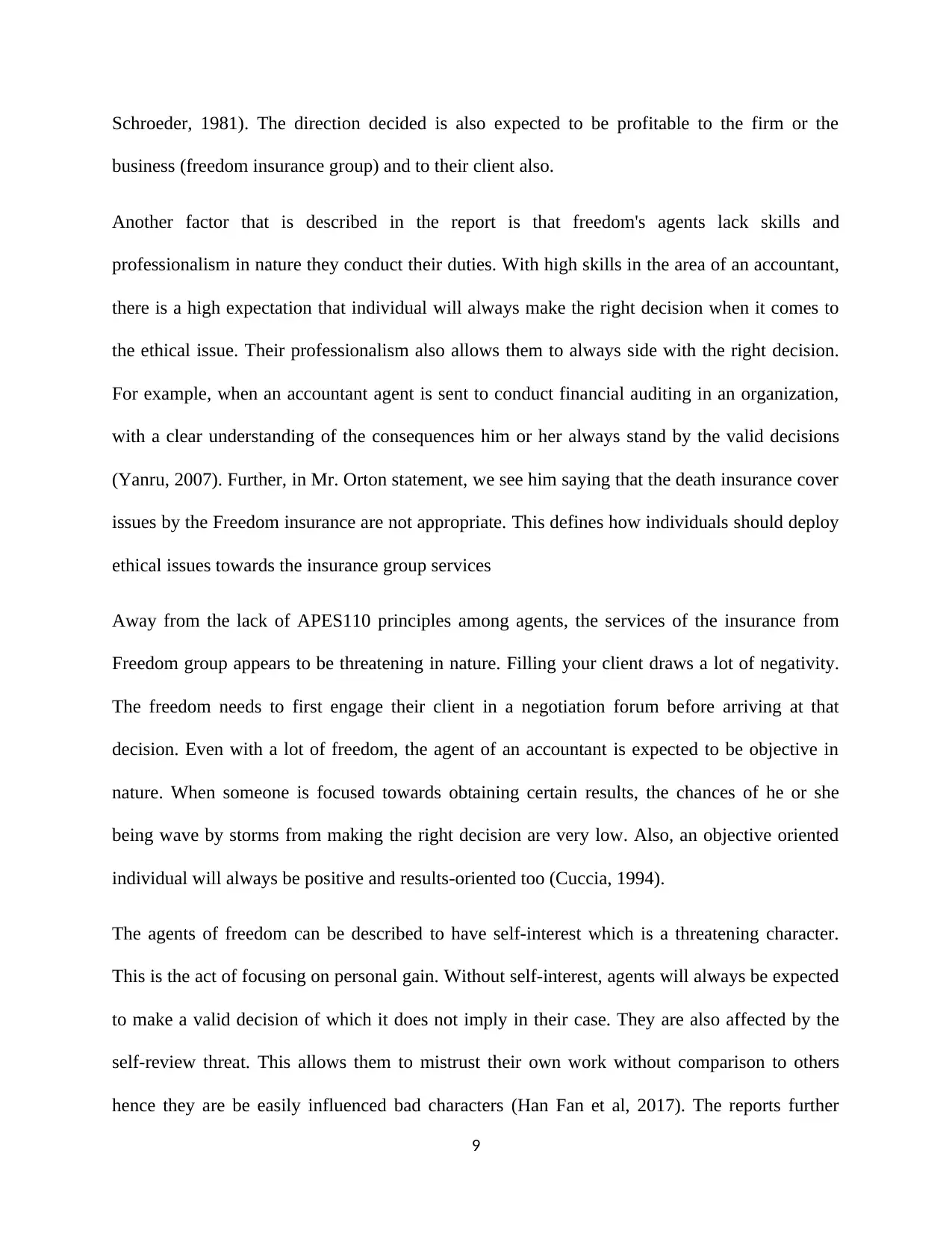
Schroeder, 1981). The direction decided is also expected to be profitable to the firm or the
business (freedom insurance group) and to their client also.
Another factor that is described in the report is that freedom's agents lack skills and
professionalism in nature they conduct their duties. With high skills in the area of an accountant,
there is a high expectation that individual will always make the right decision when it comes to
the ethical issue. Their professionalism also allows them to always side with the right decision.
For example, when an accountant agent is sent to conduct financial auditing in an organization,
with a clear understanding of the consequences him or her always stand by the valid decisions
(Yanru, 2007). Further, in Mr. Orton statement, we see him saying that the death insurance cover
issues by the Freedom insurance are not appropriate. This defines how individuals should deploy
ethical issues towards the insurance group services
Away from the lack of APES110 principles among agents, the services of the insurance from
Freedom group appears to be threatening in nature. Filling your client draws a lot of negativity.
The freedom needs to first engage their client in a negotiation forum before arriving at that
decision. Even with a lot of freedom, the agent of an accountant is expected to be objective in
nature. When someone is focused towards obtaining certain results, the chances of he or she
being wave by storms from making the right decision are very low. Also, an objective oriented
individual will always be positive and results-oriented too (Cuccia, 1994).
The agents of freedom can be described to have self-interest which is a threatening character.
This is the act of focusing on personal gain. Without self-interest, agents will always be expected
to make a valid decision of which it does not imply in their case. They are also affected by the
self-review threat. This allows them to mistrust their own work without comparison to others
hence they are be easily influenced bad characters (Han Fan et al, 2017). The reports further
9
business (freedom insurance group) and to their client also.
Another factor that is described in the report is that freedom's agents lack skills and
professionalism in nature they conduct their duties. With high skills in the area of an accountant,
there is a high expectation that individual will always make the right decision when it comes to
the ethical issue. Their professionalism also allows them to always side with the right decision.
For example, when an accountant agent is sent to conduct financial auditing in an organization,
with a clear understanding of the consequences him or her always stand by the valid decisions
(Yanru, 2007). Further, in Mr. Orton statement, we see him saying that the death insurance cover
issues by the Freedom insurance are not appropriate. This defines how individuals should deploy
ethical issues towards the insurance group services
Away from the lack of APES110 principles among agents, the services of the insurance from
Freedom group appears to be threatening in nature. Filling your client draws a lot of negativity.
The freedom needs to first engage their client in a negotiation forum before arriving at that
decision. Even with a lot of freedom, the agent of an accountant is expected to be objective in
nature. When someone is focused towards obtaining certain results, the chances of he or she
being wave by storms from making the right decision are very low. Also, an objective oriented
individual will always be positive and results-oriented too (Cuccia, 1994).
The agents of freedom can be described to have self-interest which is a threatening character.
This is the act of focusing on personal gain. Without self-interest, agents will always be expected
to make a valid decision of which it does not imply in their case. They are also affected by the
self-review threat. This allows them to mistrust their own work without comparison to others
hence they are be easily influenced bad characters (Han Fan et al, 2017). The reports further
9
⊘ This is a preview!⊘
Do you want full access?
Subscribe today to unlock all pages.

Trusted by 1+ million students worldwide
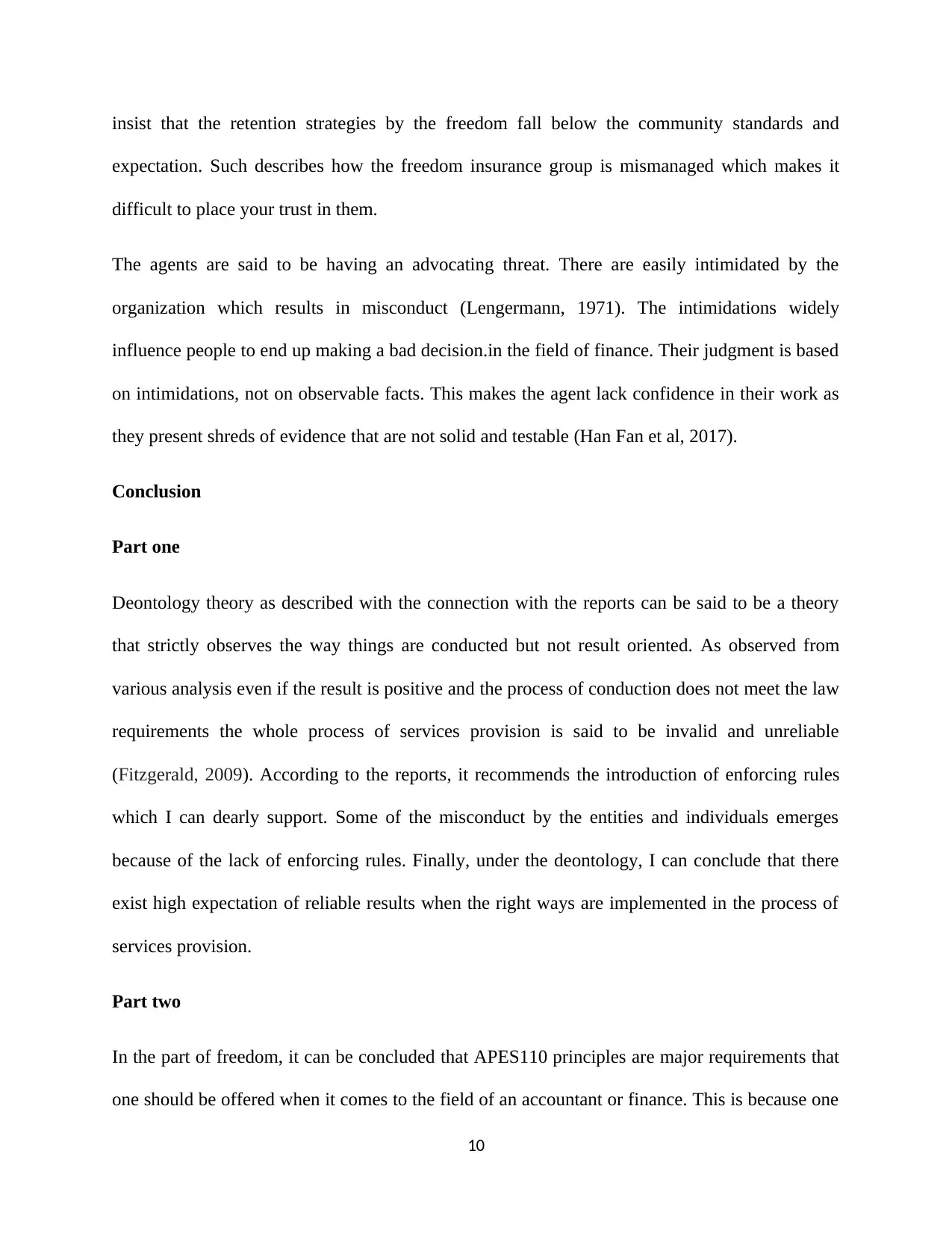
insist that the retention strategies by the freedom fall below the community standards and
expectation. Such describes how the freedom insurance group is mismanaged which makes it
difficult to place your trust in them.
The agents are said to be having an advocating threat. There are easily intimidated by the
organization which results in misconduct (Lengermann, 1971). The intimidations widely
influence people to end up making a bad decision.in the field of finance. Their judgment is based
on intimidations, not on observable facts. This makes the agent lack confidence in their work as
they present shreds of evidence that are not solid and testable (Han Fan et al, 2017).
Conclusion
Part one
Deontology theory as described with the connection with the reports can be said to be a theory
that strictly observes the way things are conducted but not result oriented. As observed from
various analysis even if the result is positive and the process of conduction does not meet the law
requirements the whole process of services provision is said to be invalid and unreliable
(Fitzgerald, 2009). According to the reports, it recommends the introduction of enforcing rules
which I can dearly support. Some of the misconduct by the entities and individuals emerges
because of the lack of enforcing rules. Finally, under the deontology, I can conclude that there
exist high expectation of reliable results when the right ways are implemented in the process of
services provision.
Part two
In the part of freedom, it can be concluded that APES110 principles are major requirements that
one should be offered when it comes to the field of an accountant or finance. This is because one
10
expectation. Such describes how the freedom insurance group is mismanaged which makes it
difficult to place your trust in them.
The agents are said to be having an advocating threat. There are easily intimidated by the
organization which results in misconduct (Lengermann, 1971). The intimidations widely
influence people to end up making a bad decision.in the field of finance. Their judgment is based
on intimidations, not on observable facts. This makes the agent lack confidence in their work as
they present shreds of evidence that are not solid and testable (Han Fan et al, 2017).
Conclusion
Part one
Deontology theory as described with the connection with the reports can be said to be a theory
that strictly observes the way things are conducted but not result oriented. As observed from
various analysis even if the result is positive and the process of conduction does not meet the law
requirements the whole process of services provision is said to be invalid and unreliable
(Fitzgerald, 2009). According to the reports, it recommends the introduction of enforcing rules
which I can dearly support. Some of the misconduct by the entities and individuals emerges
because of the lack of enforcing rules. Finally, under the deontology, I can conclude that there
exist high expectation of reliable results when the right ways are implemented in the process of
services provision.
Part two
In the part of freedom, it can be concluded that APES110 principles are major requirements that
one should be offered when it comes to the field of an accountant or finance. This is because one
10
Paraphrase This Document
Need a fresh take? Get an instant paraphrase of this document with our AI Paraphraser
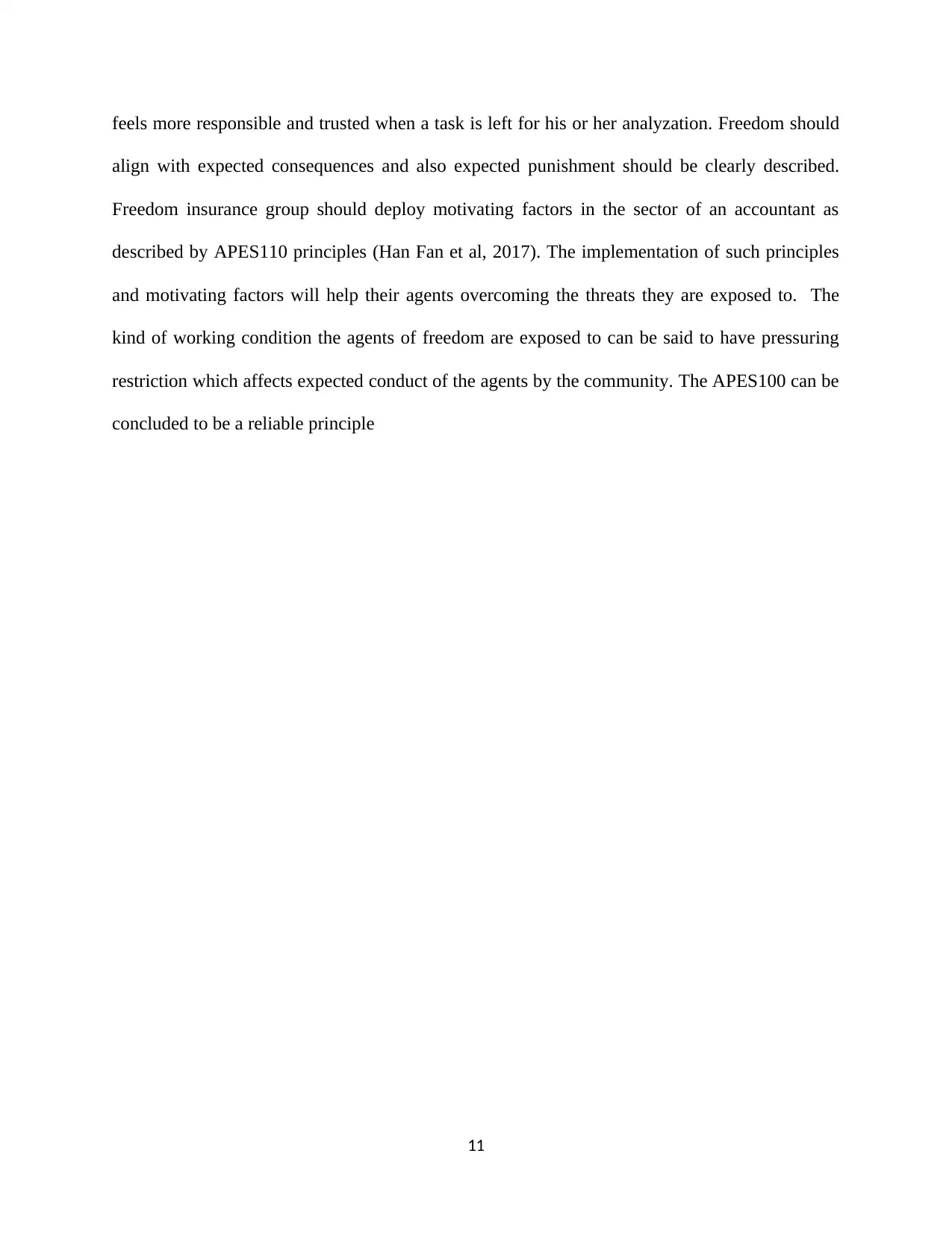
feels more responsible and trusted when a task is left for his or her analyzation. Freedom should
align with expected consequences and also expected punishment should be clearly described.
Freedom insurance group should deploy motivating factors in the sector of an accountant as
described by APES110 principles (Han Fan et al, 2017). The implementation of such principles
and motivating factors will help their agents overcoming the threats they are exposed to. The
kind of working condition the agents of freedom are exposed to can be said to have pressuring
restriction which affects expected conduct of the agents by the community. The APES100 can be
concluded to be a reliable principle
11
align with expected consequences and also expected punishment should be clearly described.
Freedom insurance group should deploy motivating factors in the sector of an accountant as
described by APES110 principles (Han Fan et al, 2017). The implementation of such principles
and motivating factors will help their agents overcoming the threats they are exposed to. The
kind of working condition the agents of freedom are exposed to can be said to have pressuring
restriction which affects expected conduct of the agents by the community. The APES100 can be
concluded to be a reliable principle
11
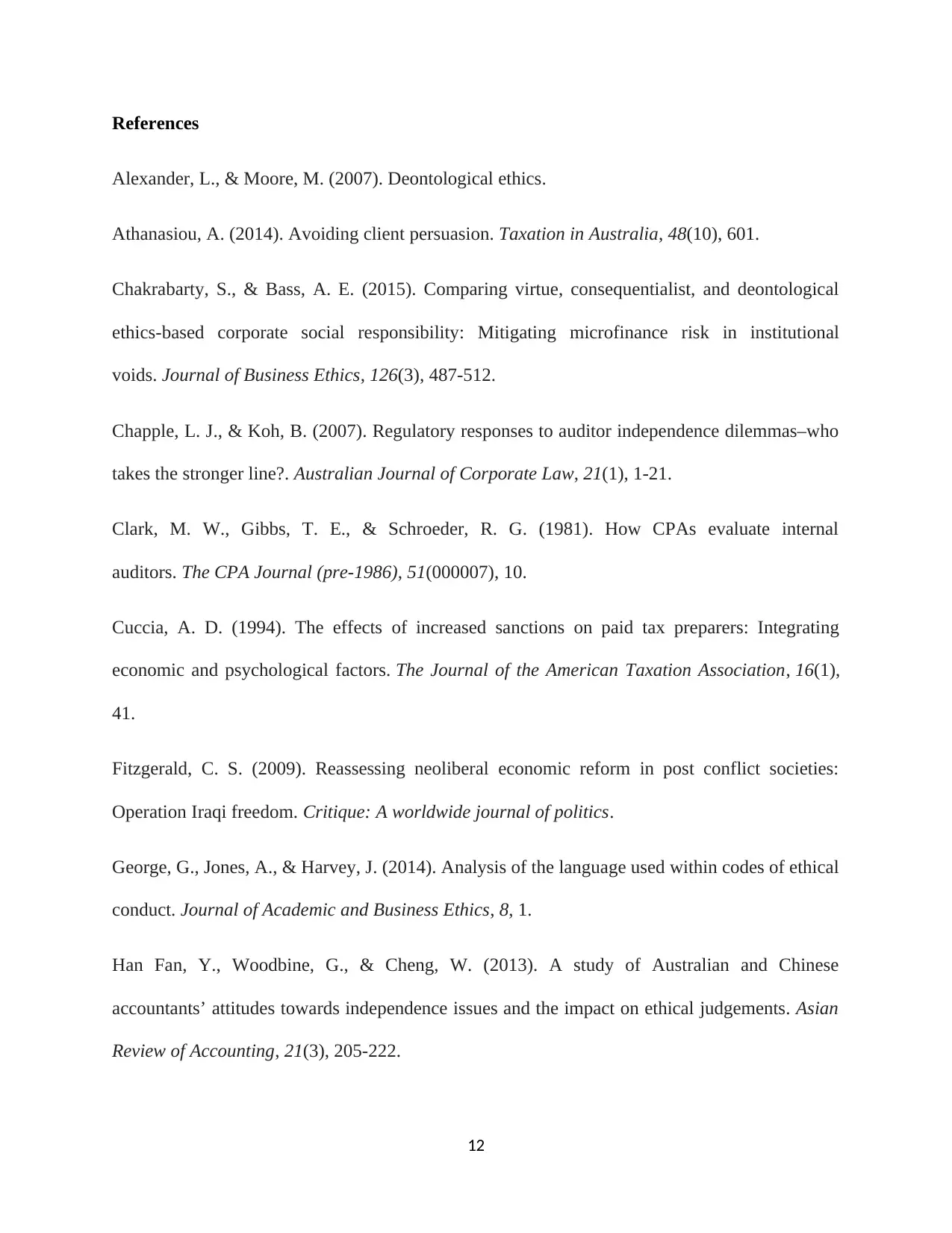
References
Alexander, L., & Moore, M. (2007). Deontological ethics.
Athanasiou, A. (2014). Avoiding client persuasion. Taxation in Australia, 48(10), 601.
Chakrabarty, S., & Bass, A. E. (2015). Comparing virtue, consequentialist, and deontological
ethics-based corporate social responsibility: Mitigating microfinance risk in institutional
voids. Journal of Business Ethics, 126(3), 487-512.
Chapple, L. J., & Koh, B. (2007). Regulatory responses to auditor independence dilemmas–who
takes the stronger line?. Australian Journal of Corporate Law, 21(1), 1-21.
Clark, M. W., Gibbs, T. E., & Schroeder, R. G. (1981). How CPAs evaluate internal
auditors. The CPA Journal (pre-1986), 51(000007), 10.
Cuccia, A. D. (1994). The effects of increased sanctions on paid tax preparers: Integrating
economic and psychological factors. The Journal of the American Taxation Association, 16(1),
41.
Fitzgerald, C. S. (2009). Reassessing neoliberal economic reform in post conflict societies:
Operation Iraqi freedom. Critique: A worldwide journal of politics.
George, G., Jones, A., & Harvey, J. (2014). Analysis of the language used within codes of ethical
conduct. Journal of Academic and Business Ethics, 8, 1.
Han Fan, Y., Woodbine, G., & Cheng, W. (2013). A study of Australian and Chinese
accountants’ attitudes towards independence issues and the impact on ethical judgements. Asian
Review of Accounting, 21(3), 205-222.
12
Alexander, L., & Moore, M. (2007). Deontological ethics.
Athanasiou, A. (2014). Avoiding client persuasion. Taxation in Australia, 48(10), 601.
Chakrabarty, S., & Bass, A. E. (2015). Comparing virtue, consequentialist, and deontological
ethics-based corporate social responsibility: Mitigating microfinance risk in institutional
voids. Journal of Business Ethics, 126(3), 487-512.
Chapple, L. J., & Koh, B. (2007). Regulatory responses to auditor independence dilemmas–who
takes the stronger line?. Australian Journal of Corporate Law, 21(1), 1-21.
Clark, M. W., Gibbs, T. E., & Schroeder, R. G. (1981). How CPAs evaluate internal
auditors. The CPA Journal (pre-1986), 51(000007), 10.
Cuccia, A. D. (1994). The effects of increased sanctions on paid tax preparers: Integrating
economic and psychological factors. The Journal of the American Taxation Association, 16(1),
41.
Fitzgerald, C. S. (2009). Reassessing neoliberal economic reform in post conflict societies:
Operation Iraqi freedom. Critique: A worldwide journal of politics.
George, G., Jones, A., & Harvey, J. (2014). Analysis of the language used within codes of ethical
conduct. Journal of Academic and Business Ethics, 8, 1.
Han Fan, Y., Woodbine, G., & Cheng, W. (2013). A study of Australian and Chinese
accountants’ attitudes towards independence issues and the impact on ethical judgements. Asian
Review of Accounting, 21(3), 205-222.
12
⊘ This is a preview!⊘
Do you want full access?
Subscribe today to unlock all pages.

Trusted by 1+ million students worldwide
1 out of 14
Related Documents
Your All-in-One AI-Powered Toolkit for Academic Success.
+13062052269
info@desklib.com
Available 24*7 on WhatsApp / Email
![[object Object]](/_next/static/media/star-bottom.7253800d.svg)
Unlock your academic potential
Copyright © 2020–2026 A2Z Services. All Rights Reserved. Developed and managed by ZUCOL.





